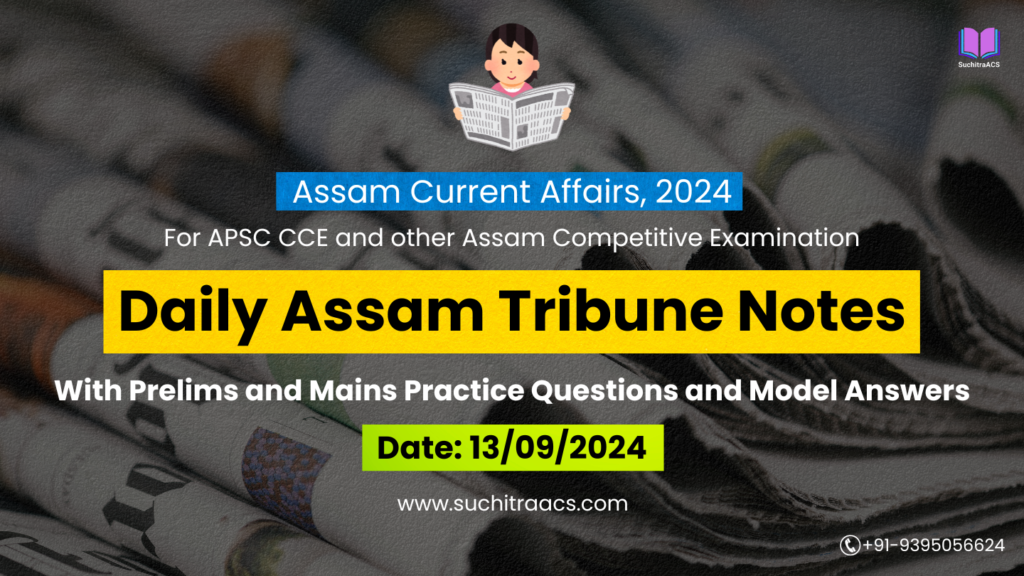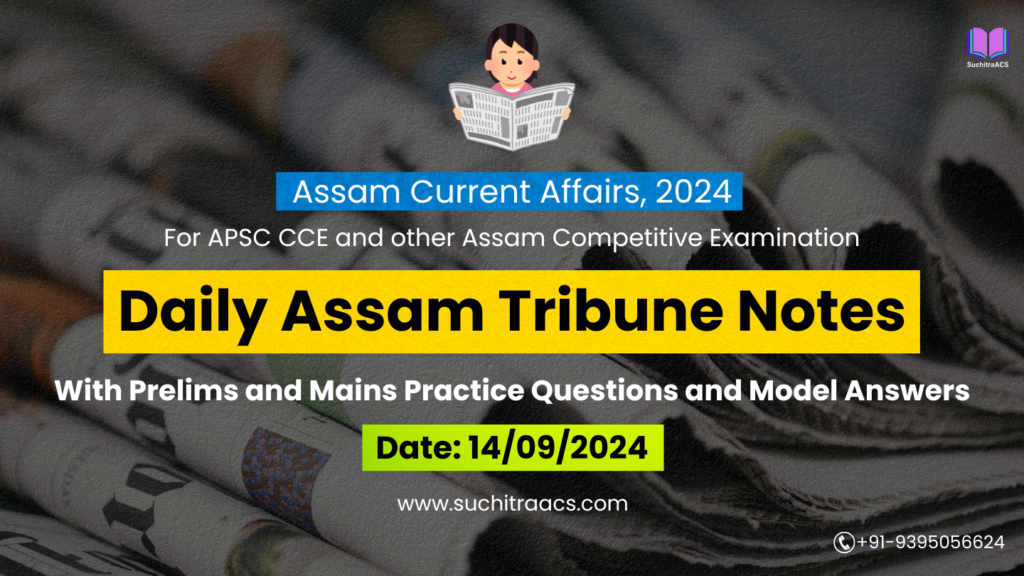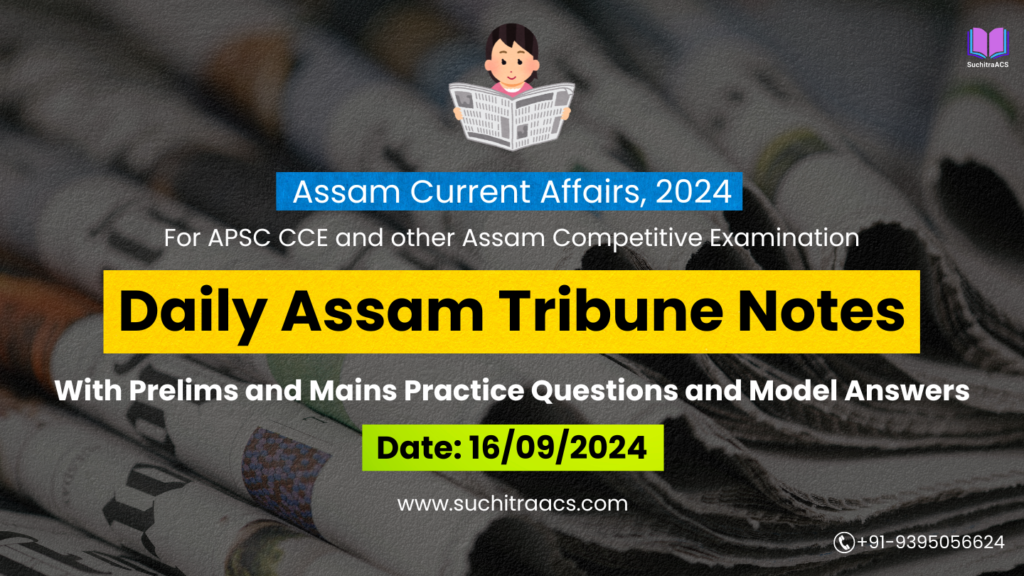APSC Current Affairs: Assam Tribune Notes with MCQs and Answer Writing (07/11/2024)
For APSC CCE and other Assam Competitive examinations aspirants, staying updated with current affairs is vital. This blog covers most important topics from the Assam Tribune today (07-11-2024). These issues are key for both APSC Prelims and Mains preparation, offering insights into the APSC CCE Syllabus.
Topic 1: Central Government’s Push for Northeast Border Resolution
GS Paper 2: Polity, Interstate Relations
Introduction:
The Union Home Secretary, Govind Mohan, held a meeting with senior officials from Assam, Meghalaya, and Arunachal Pradesh to expedite the resolution of border disputes in Northeast India. This meeting underscores the central government’s commitment to stabilizing the region through diplomatic and administrative interventions.
Key Points:
- The meeting reviewed previously agreed-upon points and urged immediate ground-level implementation.
- The Home Secretary encouraged the use of resources from the Survey of India for accurate boundary delineation.
- Talks also included updates on peace accords with militant groups, emphasizing complete rehabilitation and withdrawal of non-heinous cases.
Prelims Pointers:
- Survey of India: The national survey and mapping organization responsible for accurate boundary demarcation.
- Peace Accords: Agreements aimed at resolving conflicts with insurgent groups, often including provisions for rehabilitation and economic development.
Mains Pointers:
- Importance:
- Peace and Stability: Reduces tensions and encourages cooperation between bordering states.
- Economic Development: Stability paves the way for investment and infrastructure development in disputed areas.
- Cultural Integration: Harmonizes relations between culturally diverse communities across state borders.
- Enhanced Governance: Resolving disputes aids better local governance and public service delivery.
- Regional Security: Stable borders reduce insurgency risks and facilitate security operations.
- Challenges:
- Ethnic Sensitivities: Historical ties to land create emotional stakes for communities involved.
- Lack of Resources: Limited resources for continuous negotiations and physical demarcation on tough terrain.
- Political Pressure: Local political interests may sometimes resist border adjustments.
- Administrative Coordination: Effective implementation requires seamless collaboration among multiple agencies.
- Infrastructure Barriers: Rough terrain hinders the establishment of boundary markers and checkpoints.
- Way Ahead:
- Regular Consultations: Facilitate periodic meetings to address any emerging disputes.
- Public Awareness Campaigns: Educate locals on the long-term benefits of border settlements.
- Incentives for Cooperation: Offer development incentives to communities to support boundary resolution.
- Use of Technology: Leverage satellite imaging and GIS for precise boundary mapping.
- Independent Mediation: Employ neutral third-party mediators to handle contentious areas.
Conclusion:
A structured, technology-supported approach combined with local cooperation can ensure the success of border resolutions in Northeast India, fostering peace and development in the region.
Topic 2: Street Play Promotes Tobacco-Free Campaign in Kamrup
GS Paper 2: Social Issues, Health and Hygiene
Introduction:
The District Tobacco Control Cell of Kamrup, in collaboration with the Nirbaak theatre group, organized a street play at Saraighat College to raise awareness about the harmful effects of tobacco use among youth. The event is part of the larger Tobacco Free Youth Campaign 2.0, aimed at promoting healthy lifestyle choices.
Key Points:
- The play depicted the negative consequences of tobacco consumption on health, specifically targeting young people.
- Following the performance, students took a pledge to abstain from tobacco and promote its harmful effects.
- Informative leaflets were distributed to reinforce the campaign message.
Prelims Pointers:
- District Tobacco Control Cell: A government unit responsible for implementing tobacco control measures.
- Nirbaak Theatre Group: An Assamese theater group actively involved in social awareness campaigns.
Mains Pointers:
- Importance:
- Youth Engagement: Engages young people in health campaigns, creating a strong base of informed advocates.
- Health Awareness: Educates the public on the severe health risks associated with tobacco, reducing future healthcare costs.
- Behavioral Change: Promotes long-term behavioral shifts away from tobacco consumption.
- Community Health: Reduces exposure to secondhand smoke, benefiting non-smokers.
- Preventive Approach: Preventing addiction among youth is easier and more cost-effective than treating addiction.
- Challenges:
- Influence of Tobacco Industry: Powerful advertising and marketing campaigns can counteract awareness efforts.
- Peer Pressure: Social influences among young people can make tobacco avoidance challenging.
- Resource Limitations: Funding constraints can limit the reach and frequency of awareness campaigns.
- Cultural Acceptance: In some areas, tobacco use is culturally normalized.
- Addiction Cycle: Those already addicted face challenges in quitting, requiring more robust intervention.
- Way Ahead:
- Expansion of Campaigns: Increase campaign reach by conducting similar programs in more schools and colleges.
- Digital Outreach: Utilize social media platforms to reach a wider youth audience.
- Collaboration with NGOs: Partner with NGOs for sustained, on-ground support and outreach.
- Subsidized Counseling Services: Provide affordable or free counseling for those trying to quit tobacco.
- Legislation Enforcement: Strengthen regulations to restrict tobacco advertising near educational institutions.
Conclusion:
Community-based awareness campaigns like this street play foster a proactive stance against tobacco use, shaping a healthier future generation in Assam.
Topic 3: Fraudulent Company Busted in Guwahati
GS Paper 3: Security Issues, Ethics in Business
Introduction:
Guwahati’s Panbazar Police recently uncovered a fraudulent company, Expresco Galf Gas, involved in selling fake LPG franchises. The company, operating from offices in Central Plaza and Upasana Complex, was found deceiving customers by offering bogus franchise deals for LPG connections.
Key Points:
- Four individuals associated with the company were detained, and incriminating documents, computers, and mobile phones were seized.
- The company falsely represented itself as an authorized franchise provider of LPG connections, duping multiple customers.
- Legal proceedings have been initiated to investigate and bring justice to the victims.
Prelims Pointers:
- Franchise Fraud: A scam involving unauthorized companies posing as legitimate franchises to deceive customers.
- Expresco Galf Gas: A fraudulent entity exposed by the police for deceiving customers with fake LPG franchises.
Mains Pointers:
- Importance:
- Consumer Protection: Ensures customers are safeguarded against fraudulent schemes.
- Ethics in Business: Emphasizes ethical standards in business practices, promoting trust.
- Public Awareness: Educates the public about potential scams and enhances vigilance.
- Security and Safety: Fraudulent LPG connections pose potential hazards due to substandard equipment.
- Legal Precedents: Establishes legal consequences for fraud, discouraging similar future scams.
- Challenges:
- Rapid Spread of Fraud: Scam operations often quickly move locations to evade detection.
- Lack of Awareness: Many customers are unaware of the checks needed to verify legitimate franchises.
- Legal Loopholes: Delays in the legal process can hinder swift action against fraudsters.
- Resource Constraints: Police resources may be limited for tracking such fraud networks extensively.
- Public Distrust: Incidents like these may create public mistrust toward legitimate franchises.
- Way Ahead:
- Public Information Campaigns: Educate citizens on how to verify legitimate business franchises.
- Collaboration with Genuine Companies: Involve authorized LPG providers in awareness campaigns.
- Strengthened Legal Frameworks: Implement stricter regulations to monitor and penalize franchise fraud.
- Dedicated Fraud Detection Units: Establish specialized police units for tracking commercial fraud.
- Encourage Reporting: Set up easy channels for the public to report suspected fraudulent companies.
Conclusion:
The exposure of fraudulent companies is crucial to maintaining a safe business environment. Enhanced consumer awareness, legal reforms, and vigilant enforcement can help curb similar scams and protect public interest.
Topic 4: ACS Officers Suspended for Non-Compliance with Transfer Orders
GS Paper 2: Governance, Civil Services Conduct
Introduction:
The Assam government recently suspended five Assam Civil Service (ACS) officers for refusing to comply with transfer orders. This disciplinary action emphasizes the significance of administrative accountability and adherence to official directives within the civil services.
Key Points:
- The officers were expected to take up new positions across various districts but reportedly did not comply.
- The suspension was accompanied by departmental proceedings to examine the breach of official protocols.
- This move serves as a precedent for maintaining decorum and discipline in government services.
Prelims Pointers:
- ACS: Assam Civil Services, a branch of the state administrative services.
- Departmental Proceedings: Internal inquiries conducted to address issues of misconduct in government services.
Mains Pointers:
- Importance:
- Discipline in Civil Services: Reinforces accountability and responsiveness among officers.
- Public Trust: Maintains public confidence in the government’s ability to enforce laws impartially.
- Operational Efficiency: Ensures that administrative roles are filled promptly for smooth governance.
- Role Model for Civil Conduct: Sets a disciplinary standard within state services.
- Adherence to Chain of Command: Upholds the structural integrity and hierarchy of public administration.
- Challenges:
- Officer Shortages: Non-compliance could delay filling of critical positions, impacting service delivery.
- Local Resistance: Officers may resist transfers due to local or personal interests.
- Legal Implications: Disciplinary actions can be challenged, prolonging administrative processes.
- Bureaucratic Resistance: Cultural issues within bureaucracy may discourage strict compliance.
- Public Perception: Frequent suspensions can impact public perception of government stability.
- Way Ahead:
- Clear Transfer Policies: Establish transparent and well-communicated transfer policies.
- Regular Monitoring: Conduct periodic reviews to ensure compliance and address grievances.
- Performance Incentives: Encourage adherence to transfers through positive reinforcement.
- Improved Communication Channels: Address officers’ concerns proactively.
- Robust Legal Framework: Strengthen legal provisions to deter non-compliance effectively.
Conclusion:
The suspension of ACS officers underscores the need for strict adherence to administrative orders, ensuring a responsive and disciplined civil service in Assam.
Topic 5: India’s Ranking in Global Nature Conservation Index Criticized
GS Paper 3: Environment, Biodiversity Conservation
Introduction:
India’s recent low ranking in the Global Nature Conservation Index (NCI) has sparked debate among environmentalists and policymakers. Critics argue that the index does not consider the unique challenges faced by megadiverse countries, and it may not accurately reflect India’s conservation efforts.
Key Points:
- India, a megadiverse country with unique conservation challenges, ranked poorly on the NCI.
- Experts suggest that indices like NCI may not fully account for India’s biodiversity and the ongoing conservation efforts under the Kunming-Montreal Global Biodiversity Framework.
- India has 18 biosphere reserves and multiple conservation programs that focus on both biodiversity and indigenous community welfare.
Prelims Pointers:
- National Biodiversity Strategy and Action Plan (NBSAP): India’s strategy aligning with the Kunming-Montreal Global Biodiversity Framework for conservation.
- Biosphere Reserves: Protected areas aiming to balance conservation and human activity, focusing on biodiversity and traditional lifestyles.
Mains Pointers:
- Importance:
- Biodiversity Conservation: Safeguards flora, fauna, and ecosystems vital for ecological balance.
- Global Recognition: Highlights India’s contribution to global conservation through large-scale initiatives.
- Support for Indigenous Communities: Many reserves focus on community welfare alongside environmental protection.
- Sustainable Development: Conserving biodiversity is essential for sustainable natural resource management.
- International Collaboration: Aligns India with global environmental frameworks for climate and biodiversity.
- Challenges:
- Index Limitations: Conservation indices may not fully recognize the complexities of megadiverse countries.
- Funding Constraints: Conservation initiatives require significant, ongoing financial support.
- Climate Impact: Climate change intensifies the challenges of preserving fragile ecosystems.
- Human-Wildlife Conflicts: Balancing community needs with conservation in densely populated areas.
- Monitoring Issues: Effective monitoring of biodiversity reserves requires advanced technology and skilled personnel.
- Way Ahead:
- Localized Conservation Efforts: Develop region-specific plans to address diverse conservation needs.
- Enhanced Funding: Allocate funds for conservation from both government and international grants.
- Technology Adoption: Use satellite and GIS tools for improved monitoring of protected areas.
- Community Involvement: Engage local communities in conservation efforts to build sustainable practices.
- Index Improvement: Work with international bodies to refine conservation indices to reflect diverse country contexts.
Conclusion:
India’s ranking in the NCI underscores the need for nuanced assessment metrics that recognize conservation challenges in megadiverse nations. With increased funding and community involvement, India can strengthen its biodiversity conservation strategies.
APSC Prelims Practice Questions
Topic 1: Central Government’s Push for Northeast Border Resolution
Question 1: With reference to border resolution efforts in Northeast India, consider the following statements:
- The Survey of India is the primary agency responsible for demarcating boundaries within India.
- Peace accords signed with insurgent groups in the Northeast often include provisions for their rehabilitation and economic development.
- Only the central government is authorized to conduct negotiations and implement border agreements in Northeast India.
Which of the statements given above is/are correct?
A. 1 and 2 only
B. 2 and 3 only
C. 1 and 3 only
D. 1, 2, and 3
Answer: A. 1 and 2 only
Explanation:
- Statement 1 is correct. The Survey of India is the national mapping and surveying agency, responsible for boundary demarcations.
- Statement 2 is correct. Peace accords in the Northeast typically include provisions for the rehabilitation and development of insurgent groups to ensure long-term peace.
- Statement 3 is incorrect. While the central government initiates border agreements, state governments are often involved in negotiations, especially for interstate border disputes.
Thus, the correct answer is A.
Topic 2: Street Play Promotes Tobacco-Free Campaign in Kamrup
Question 2: Which of the following statements is/are correct about tobacco control initiatives in Assam?
- The District Tobacco Control Cell (DTCC) in Kamrup conducts public awareness campaigns to reduce tobacco use, particularly among youth.
- Street plays are used as part of the Tobacco-Free Youth Campaign to engage the public and create awareness about the health hazards of tobacco.
- The Tobacco-Free Youth Campaign is exclusively organized by the District Tobacco Control Cell without any external collaboration.
Select the correct answer using the code given below:
A. 1 and 2 only
B. 2 only
C. 1 and 3 only
D. 1, 2, and 3
Answer: A. 1 and 2 only
Explanation:
- Statement 1 is correct. The District Tobacco Control Cell (DTCC) in Kamrup undertakes public awareness campaigns to discourage tobacco use, especially among the youth.
- Statement 2 is correct. Street plays are used in campaigns to highlight the dangers of tobacco, making it accessible and relatable for the public.
- Statement 3 is incorrect. The campaign often involves collaboration with theater groups, NGOs, and other organizations to enhance its reach and impact.
Thus, the correct answer is A.
Topic 3: Fraudulent Company Busted in Guwahati
Question 3: Consider the following statements about franchise fraud in India:
- Franchise fraud involves unauthorized entities deceiving customers by falsely representing legitimate businesses.
- Only the police are authorized to investigate and prosecute franchise fraud cases in India.
- Public awareness is a critical component in preventing franchise fraud and safeguarding consumers.
Which of the statements given above is/are correct?
A. 1 and 2 only
B. 1 and 3 only
C. 2 and 3 only
D. 1, 2, and 3
Answer: B. 1 and 3 only
Explanation:
- Statement 1 is correct. Franchise fraud involves unauthorized entities pretending to represent legitimate businesses to deceive and financially exploit customers.
- Statement 2 is incorrect. While the police play a key role in investigating fraud, other agencies such as the Consumer Protection Council and legal bodies also provide recourse to victims.
- Statement 3 is correct. Public awareness campaigns are essential in preventing franchise fraud, as informed consumers are better able to identify and avoid fraudulent schemes.
Thus, the correct answer is B.
Topic 4: ACS Officers Suspended for Non-Compliance with Transfer Orders
Question 4: Which of the following statements regarding the Assam Civil Services (ACS) is/are correct?
- ACS officers are bound by state transfer orders and are expected to comply with government postings.
- Non-compliance with transfer orders can lead to disciplinary action, including suspension and departmental inquiries.
- Transfer orders for ACS officers are issued exclusively by the central government.
Select the correct answer using the code given below:
A. 1 and 2 only
B. 1 only
C. 2 and 3 only
D. 1, 2, and 3
Answer: A. 1 and 2 only
Explanation:
- Statement 1 is correct. ACS officers, as part of state administrative services, are required to comply with state-issued transfer orders.
- Statement 2 is correct. Disciplinary action, such as suspension and departmental inquiries, can be taken against officers for non-compliance.
- Statement 3 is incorrect. Transfer orders for ACS officers are issued by the Assam state government, not the central government.
Thus, the correct answer is A.
Topic 5: India’s Ranking in Global Nature Conservation Index
Question 5: With reference to the Global Nature Conservation Index (NCI), consider the following statements:
- The NCI ranks countries based on their biodiversity conservation efforts and environmental policies.
- India’s ranking in the NCI reflects challenges associated with being a megadiverse country with limited resources for conservation.
- India’s National Biodiversity Strategy and Action Plan (NBSAP) aligns with the Kunming-Montreal Global Biodiversity Framework.
Which of the statements given above is/are correct?
A. 1 and 2 only
B. 2 and 3 only
C. 1 and 3 only
D. 1, 2, and 3
Answer: D. 1, 2, and 3
Explanation:
Statement 3 is correct. India’s National Biodiversity Strategy and Action Plan (NBSAP) aligns with international biodiversity frameworks, including the Kunming-Montreal Global Biodiversity Framework.
Thus, the correct answer is D.
Statement 1 is correct. The NCI evaluates countries on their biodiversity conservation efforts, environmental sustainability, and policies.
Statement 2 is correct. India’s lower ranking in the NCI can be attributed to the challenges faced by a megadiverse country, including financial and infrastructural limitations for conservation.
APSC Mains Practice Question
Topic: Challenges in Governance and Accountability in Assam’s Civil Services
Question: Analyze the importance of accountability and compliance in Assam’s civil services, particularly in light of recent disciplinary actions against ACS officers for non-compliance with transfer orders. What measures can be taken to ensure better adherence to administrative protocols among civil servants? (250 words)
Model Answer:
Introduction:
Civil services play a crucial role in maintaining governance and implementing policies at the state level. In Assam, recent suspensions of Assam Civil Services (ACS) officers for non-compliance with transfer orders underscore the importance of accountability and adherence to administrative directives.
Body:
Importance of Accountability and Compliance in Civil Services:
- Operational Efficiency: Compliance with transfer orders ensures that key administrative roles are filled, promoting efficient governance and uninterrupted service delivery.
- Public Trust: Disciplinary actions against officers for non-compliance reinforce public trust in the government’s commitment to accountability and transparency.
- Organizational Discipline: Following administrative protocols instills discipline within the civil services, helping maintain the integrity and responsiveness of government functions.
- Resource Optimization: Transfers help in optimal utilization of resources by placing officers where they are most needed, balancing expertise across districts.
- Professional Standards: Adherence to orders strengthens civil service ethos, promoting a culture of dedication and responsibility within state administration.
Challenges and Measures to Ensure Better Adherence:
- Clear Transfer Policies: Define transparent, merit-based transfer policies to minimize ambiguity and ensure fairness, reducing resistance among officers.
- Training and Orientation Programs: Conduct regular training sessions to educate officers on the importance of compliance and the implications of non-compliance.
- Performance-Based Incentives: Offer incentives for officers who adhere to transfer orders and demonstrate commitment to their roles.
- Grievance Redressal Mechanisms: Establish an accessible platform where officers can voice concerns related to transfers and seek redressal, fostering openness and reducing friction.
- Strengthened Disciplinary Procedures: Ensure swift and fair disciplinary action for non-compliance, deterring similar actions in the future and maintaining administrative order.
Conclusion:
Accountability and compliance in civil services are essential for maintaining efficient governance. By fostering a transparent, supportive, and disciplined administrative environment, Assam can ensure that its civil services are more responsive, accountable, and aligned with public welfare goals.
✨ Best APSC CSAT Course in Assam!

🔔 Join Our WhatsApp Study Group!
For exclusive access to premium quality content, including study materials, current affairs, MCQs, and model answers for APSC CCE and other Assam competitive exams.
Click here to join: SuchitraACS Study WhatsApp Group
📚 Want to know more about SuchitraACS’s most affordable courses?
Click here to know more: SuchitraACS Courses for APSC CCE and Assam Competitive Examinations




